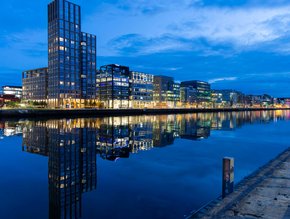Lenovo’s Ian Jeffs on Harnessing AI to Power Net Zero Goals

Using technology in tandem with sustainable development could lead to unprecedented innovation that is forward-thinking and emits less.
As we heard at our sister publication event, Sustainability LIVE: Net Zero, innovative technologies like AI can be harnessed by businesses to future-proof the data centre sector and ensure that it is lessening its impact on the environment.
We hear from a thought-leader in this subject, Ian Jeffs, UK&I Country General Manager at Lenovo Infrastructure Solutions Group. An industry veteran with a PC and data centre career spanning more than 25 years, Jeffs was part of the first team to establish one of the first PC businesses and has worked across huge technology organisations like Tech Data, Arrow and IBM.
He explains how AI can help enterprises achieve Net Zero across their data centre portfolio and how Lenovo is currently working to achieve its sustainability initiatives.
How can AI help businesses best achieve their Net Zero goals?
AI allows businesses to optimise energy consumption, streamline processes, and identify opportunities for efficiency improvements. For instance, AI algorithms can analyse large datasets to identify energy-saving opportunities within operations, optimise supply chains to reduce emissions, and enable predictive maintenance to minimise energy wastage.
Additionally, AI-driven insights can inform strategic decision-making towards sustainable practices, such as transitioning to renewable energy sources or developing green products and services.
Why is it important for the data centre industry to be harnessing AI in this way?
Harnessing AI in the data centre industry is crucial for optimising energy consumption, enhancing operational efficiency, and reducing environmental impact. By utilising AI algorithms for workload optimisation, predictive maintenance, and energy management, data centres can minimise energy wastage, improve cooling efficiency, and optimise resource allocation.
Additionally, AI-powered data analytics can enable data centre operators to identify trends, forecast demand, and optimise capacity planning, leading to more sustainable and cost-effective operations.
Do you have any particular use cases (company or client) for how AI is working to advance sustainability?
AI-driven optimisation analytics can improve energy efficiency in manufacturing processes, smart grids, and transportation systems.
Similarly, AI-enabled predictive analytics can enhance resource management in agriculture, water conservation, and waste management. Additionally, AI-powered monitoring systems can help track and mitigate environmental risks, such as deforestation, pollution, and climate change impacts.
One specific example is our work with Imperial College London and Intel which revolutionised research and training with sustainable HPC and AI capabilities. Researchers across Imperial and its global collaboration networks have access to more sustainable HPC and AI capabilities for the journey towards a sustainable, zero pollution future.
How is Lenovo currently utilising AI? How is this helping the company to achieve its sustainability goals?
We are utilising AI to optimise energy consumption, enhance operational efficiency, and drive sustainability initiatives across our products and services. For instance, we are leveraging AI algorithms for workload optimisation, predictive maintenance, and energy management in our data centre solutions. Our AI solutions not only assist ourselves but play a critical role in helping our customers achieve their sustainability goals.
We recently announced our newest, AI-powered offerings that are helping companies harness AI to enhance business operations and improve digital experiences. The offerings included a Sustainability AI Engine which helps companies visualise the influence of business choices that could impact their sustainability objectives and choose the best sustainability options to achieve their desired outcome.
We are committed to bringing the power of AI to all, to help build a smarter, more inclusive, and more sustainable world.
What’s next for the sustainable data centre? How do you see AI evolving to support this?
The future of sustainable data centres will likely involve further integration of AI technologies to optimise energy efficiency, enhance operational resilience, and minimise environmental impact. AI algorithms will continue to evolve to better predict and manage workload demand, optimise cooling systems, and automate energy-saving measures.
Additionally, advancements in hardware design, such as the development of energy-efficient chips and liquid cooling solutions, will contribute to the sustainability of data centre infrastructure. As the demand for computing power continues to grow, AI will play an increasingly important role in driving innovation and sustainability in the data centre industry.
******
Make sure you check out the latest edition of Data Centre Magazine and also sign up to our global conference series - Tech & AI LIVE 2024
******
Data Centre Magazine is a BizClik brand






